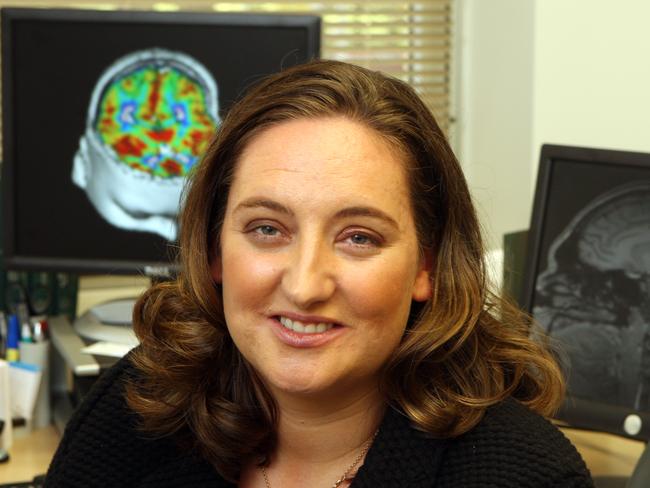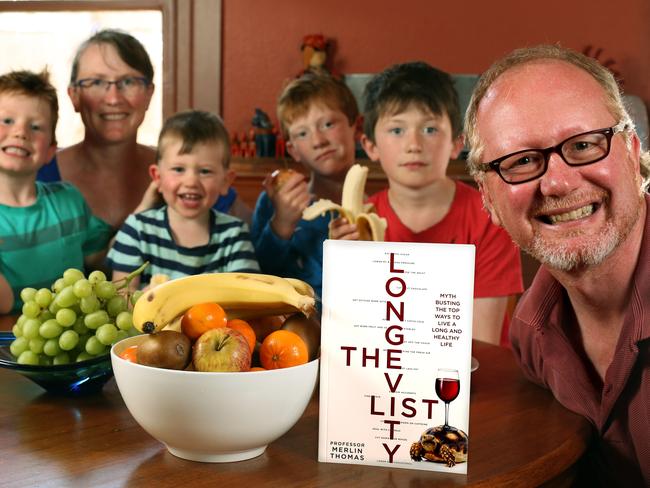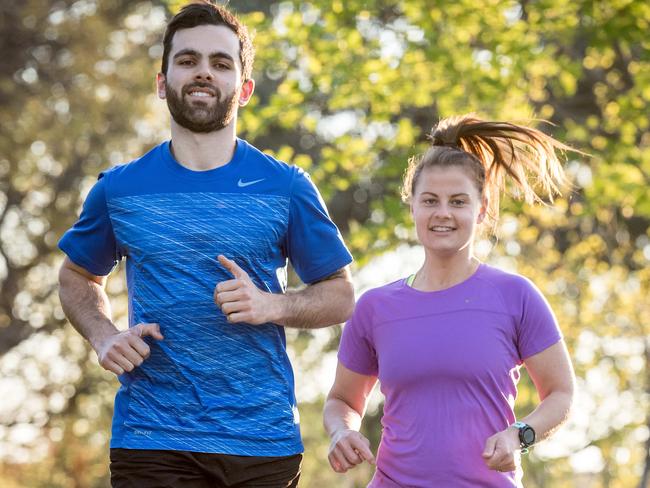How to live longer and be happier: If we beat disease, quality of life will win
WITH 38 million preventable deaths globally each year from chronic diseases, University of Melbourne researchers are on a quest to give practical lifestyle advice to help people live longer, healthier and happier lives.
VIC News
Don't miss out on the headlines from VIC News. Followed categories will be added to My News.
VICTORIAN women typically live four years longer than men, but these extra years are more likely to be spent with a disability that affects their daily life.
RESEARCHERS SAY ANTI-INFLAMMATORY DIET KEY TO HEALTH
EATING RIGHT COULD BE BEST MEDICINE FOR MOOD
MOTHERS’ GUT BACTERIA COULD IMPACT FUTURE HEALTH OF CHILDREN
University of Melbourne researchers are studying the overlap and joint risk factors for the most common chronic diseases, with the aim of giving more practical lifestyle advice to help people live longer, healthier and happier lives.
Royal Melbourne Hospital neurologist and director of the university’s healthy ageing program, Professor Cassandra Szoeke, said the World Health Organisation had now made chronic disease its top health action priority.
There are 38 million preventable deaths globally each year from diseases such as heart disease, stroke, cancer and type 2 diabetes.
“By definition, chronic diseases develop over decades,” Prof Szoeke said.
“We now know dementia takes 20 to 30 years to develop. This gives us a big window of time to intervene and change the health trajectory.”

The healthy ageing program is combining data gathered from an online survey of 22,000 Australians which started three years ago, with a study of 2000 women — now aged over 70 — who have been followed for almost 30 years.
Given that their research shows Australian over the age of 50 don’t have just one chronic disease — they either have none or three or more — Prof Szoeke said there was a “real urgency” to find the evidence to give better lifestyle advice regarding diet, exercise and how to maintain a healthy weight to prevent chronic disease being a given of ageing.
“We’re looking at the cross-section of chronic diseases — brain, vascular and muscle.
“The risk factors and treatments all overlap,” she said.
“We want to understand those interactions and overlaps, focusing on the joint risk factors and looking at what people do which gives them the best overall health.”
Women, particularly, are at greater risk of developing chronic illnesses such as depression, arthritis, heart disease, stroke and dementia.
Prof Szoeke’s landmark study of 400 women published last year, in which all movement — not just structured exercise — was measured against their cognitive health, found daily physical activity was the best way to preserve brain function.
While starting early is best, even those who started exercising after 50 gained protection. “People who reported doing something every day had the best memory and processing speed,” she said.

SIMPLE STEPS TO PUT YOU ON THE RIGHT PATH
FOR the most part, it’s not our genes that matter, but what we do with them.
That’s the advice from Monash University clinician and researcher Professor Merlin Thomas in his new book, The Longevity List.
He separates the myths from the science behind modern lifestyle choices, and details what we can do to live longer and healthier lives.
“You can make a very healthy life from very simple decisions. You don’t have to eat cardboard or a weird type of foreign diet. You can eat Australian food and be healthy and live a long life as a result,” Prof Thomas said.
“We eat too much ... our choices are around how costly it is or how convenient it is. Every day when you see a set of stairs rather than a lift, every day you park your car a bit further away and walk a bit further. There are opportunities to add exercise.
“You can have a fun life and a long life without having to do too much — the simple things will count.”
Prof Thomas has surveyed hundreds of people, asking them what they did every day that they thought were good and bad for their health, aiming to find the science to support whether regular habits were helpful, or outdated beliefs.
“A lot of the messages are common sense, but it’s hard to understand the evidence behind a lot of those things,” he said. The main message was ‘self-temperance’: being aware of what you can do, steering away from excesses.”

PLANNING AND HARD WORK KEEP US FIT
MAKING the healthy choice the easy choice is key to one Melbourne couple’s healthy lifestyle.
A typical weekend for Melissa Ensink and Dante Santalucia includes a big grocery shop and time to prepare lunches and half-start dinners for the week.
“We know that when we get home and we’re tired, we’ve already got some easy options at least half-ready, or at least the food is in the house,” Ms Ensink said.
As a health planner in local government, working on projects such as increasing walking rates, Ms Ensink said her career had reinforced the need to work hard at staying fit and well.
“I understand how important it is to look after your body and mind,” she said. “That helps me be more intrinsically motivated.”
The 32-year-old is training for her fifth marathon, and became a yoga teacher after falling in love with the activity she tried as a way to relax from running.
When Ms Ensink is at yoga, Mr Santalucia, 26, is usually at the gym. He has taken up Brazilian jiu-jitsu: “It’s definitely been a lot of learning. There is an element of mindfulness about it, too.”
The couple set up their spare room as a “Zen space”, with a salt lamp and indoor plants where they can meditate or do yoga.
HOW THEY DO IT
Make exercise part of your morning routine: “That sets me up for a good day,” said
Melissa. “You’re more likely to make good food choices.”
Make exercise convenient: Find ways to be active close to work or home.
Plan your meals: “We spend a couple of hours getting our groceries and doing our meal prep for the week on the weekend. Try not to go to the supermarket too many times during the week.”
Incidental exercise: Try to include exercise such as walking or riding as part of your commute.


